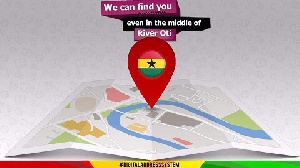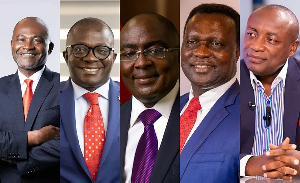On November 11, 2017, I heard for the first time about the GhanaPostGPS Digital Address System and all the incertitude and confusion surrounding it. So, pardon me if you find this article late but I hope many find it and it helps clarify all the perplexity that has been going on.
Kingsley Komla Elikem Mortey, in particular, has been an advocate citing why he thinks the system/app is nothing innovative. To be fair to Kingsley, he is technically right that this is nothing new (at least the concept). The concept of a Digital Address System also known as location encoding system has been experimented for a while.
Digital Address Systems have been mostly complementary projects used to address specific needs at a particular time. They were not intended to be a permanent solution to replace conventional street address system; they are mostly used for unmapped areas of the world such as in Africa’s largest slum, Kibera in Nairobi.
The idea is simple, every location in the world has a geographic coordinate system, latitude, longitude and elevation but latitudes and longitudes albeit invented somewhere BC are not used outside of mostly academia for practical real-world usage, mostly because the numbers are difficult to remember and therefore not practical to humans to pass long as a location tool.
As such, translating those codes into friendly easy to remember formats has been experimented for different purposes throughout the last 2 decades in particular. I mentioned I heard about the Ghana implementation, just yesterday (11/10/2017) and in so doing, I chanced on an interview with Nana Osei Kwasi Afrifa, the CEO of Vokacom (GhanaPostGPS implementers) had with Kojo Yankson of Joy FM where Nana Osei basically defended Vokacom's system and why it costs 2.5 million dollars.
Do I think (the system, not just the app) it’s worth $2.5m? Probably not but pricing for these things are very subjective and it’s up to the evaluators to do a thorough job of understanding what they are buying into. If the evaluators are fairly confident in the skill and technical know-how of what they were privy to and subsequently entered into during the evaluation process, I will leave it as such.
In his interview, Nana Osei insisted his company’s system is different from what may already exist because theirs is not Mathematics based system. The short answer to this is it depends on how one defines Mathematics based. The fact is you cannot develop even the simplest mapping app to generate shortcodes without basic programming construct logic, which technically is mathematics. But the math he is referring to is a bit more complex so for simplicity sake, I will say he is right. What is incorrect is, there are already systems out there that are not heavily dependent on Mathematics.
Here is a brief explanation of what he means by theirs is not a mathematics based system and where Kingsley also falls short in this defence. Of all the existing systems of which there are many (not an exhaustive list), Universal Transverse Mercator coordinate system, MapCode, Open Location Code, GeoHash, Open Post Code, Natural Area Code, Maidenhead Locator System, Web-based services (Zippr, What3Words) Digital Addresses Systems are all generated using algorithms but the complexity of the algorithms differ.
For instance, using Open Post Codes, codes can be defined globally or within a containing country, when you have codes defined within a containing country such as the system sold to the Ghana government, there is more control over codes used as opposed to outside of the containing country where codes are entirely generated using algorithms using the given latitudes and longitudes, the algorithms are developed to give a unique digital address(short code) and are location agnostic such that you can get a unique easier to remember address using geographic coordinate systems.
In the case of AsaaseGPS sold/licensed to the Ghana government as GhanaPostGPS, they overlay the district map of Ghana and use a 1 to 1 scale to demarcate Ghana the into sections of 5m by 5m. They could have made it 10m by 10m, 4m by 4m and so on, although 3m by 3m is the most you can get good accuracy if using a smartphone to locate coordinates. They then assigned an easier to remember the digital address to each of the square grids. This demarcation will need assistance form urban planners and geographers alike to obtain the correct town, district boundaries and so on as is.
Contrary to the notion particularly from Kingsley perspective [that] the system does not integrate with any other system and therefore it is a waste; understand this is not exactly accurate and here's why. There is no standard for digital address system anywhere in the world, to begin with, primarily because they have been used as complementary and not a replacement to standard addressing systems, which in most cases is the street addressing system (not necessarily having street names).
It should be noted street addressing is not used all over the world; places like Japan and South Korea have unconventional addressing systems. In Japan as an example, most streets are not named except major thoroughfares’; they use what is called the area address system. Japan has 47 areas called Prefectures, divisions continue up to assigning building numbers. This is an inverse of what most will be used in Western Countries. Do Google maps and other mapping software support the Japanese address system? The answer is yes! The point here is it is okay for Ghana to have a unique addressing system, in order words, it’s okay for Ghana to opt for a solution that is mostly used as an additional tool to solve a problem she may have given up solving the right way.
Now Japan’s address system is not a digital addressing system. It’s just how Japan chose to address the country post World War 2. On the contrary, Digital Address Systems have been used mostly as emergency tools and not a definitive system which the Ghana Government is attempting to do. For all intents and purposes, it might work if implemented rightly, the approach taken is better than what Ivory Coast, Nigeria, Mongolia, Sint Maarten, Côte d’Ivoire, Djibouti, Tonga and Solomon Islands and the rest are using with What3Words’ solution. All these countries, have one thing in common, huge unmapped areas which is affecting the growth of e-commerce and limiting the growth of their economies. The fast solution is to deploy a technology that simplifies their citizenry having to provide the latitudes and longitudes for postal deliveries.
Why is the Ghana option at least a better solution? Aside from support for sequential numbering which helps identify close or near locations, there was the extra step to customize the technology to fix the needs of Ghana better, the customization is the value added. Instead of relying 100% on an algorithm to generate a short-code, the developers overlaid the spatial district map of Ghana and adopted a naming convention following region and districts in Ghana - that still involves the usage of algorithms albeit not as obvious as a fully autonomous system. Overlaying the district map of Ghana made Ghana a contained country within the system, outside of Ghana, AsaaseGPS will still provide a digital address to any location. It’s important to note the GhanaPostGPS is based off AsaaseGPS which has the entire globed digitally mapped, although obtaining a digital address in the GhanaPostGPS variant has been intentionally if not annoyingly restricted to the boundaries of Ghana. Aside from Ghana though, AsaaseGPS uses mathematics/algorithms to derive a short-code/digital address.
The version licensed to Ghana government is less dependent on autonomous algorithms for the reasons stated above. On the GhanaPost version, in particular, there is absolutely no need to ask people to provide their phone numbers and/register to use the system on their phones through an app. It’s absolutely not necessary. As if to imply “register and we will assign you an address”. If such data is being collected for analytical reasons, there are other ways of doing that without requesting for phone numbers. The idea that one needs to download an app from the app store to see their already assigned digital address is also misinformed. You can just go directly to Ghanapostgps.com / Asaasegps.com on your laptop, phone or tablet, and to see (using the verb get is misleading as well) your digital address, no need to download an app, to begin with. It’s a bit innocuous to ask people to register to use an app than to ask them to register to use a map feature through the browser.
The million-dollar question is: can Ghana use this as its addressing system permanently? The answer to that is, it depends. It’s entirely possible if the system is improved - many things can be done to improve the system, but I will save that to the implementers to think through except for one: in system design 101, you never assume that users are always rational and will always provide accurate data. If you're asking users to register their 20m by 20m space (assuming 4 blocks are owned) by confirming that grid belongs to them, there will be some that will inevitably provide incorrect registration details for different reasons.
In the beginning, this might be less of an issue but once there is user confidence, this will happen - how robust is the failsafe mechanism? Is there even one in place? Before the above is misunderstood, I am not referring to 'hacking' - I am referring to ordinary 'exception handling' to handle system abnormalities.
I will save this last bit to address Kinsley’s concern that Ghana is reinventing the wheel, more so the generated digital address or shortcode cannot be used with any Google application [in particular] to find locations. As a result, Ghana will need to apply to standardize this and so on, all true but not unheard of. For those of you who have seen Kinsley’s video, he specifically mentions a site called plus.codes. Plus.codes, officially called Open Location Code is a Google complementary project. The libraries (not school library but programming libraries) are freely available for anyone to use and/or extend on. So, anyone with requisite knowledge can study open library code libraries including libraries for the few others I have mentioned above as well and use those as a base to program their own shortcodes. Once done, you can call your program however that you want (eg. Kofi’s GPS).
Because Open Location Codes is a Google project, the default short-codes generated is now supported by Google maps, and by Google maps only. No other mapping software, such as Bing maps supports plus.codes. If anyone changes the shortcodes for their own use, Google maps will not support it out of the box. Another example of an existing system is the What3Words used in Ivory Coast and few other countries stated above as well where each location is given a set of 3 unique words. Like the AsaaseGPS/GhanaPostGPS, What3Words is not supported by Google maps.
What this proves is the technology for Digital Address Systems exists and how you choose to use it and/or extend the technology is entirely up to the implementer. In the case of Ghana, there is a possibility for Google to support it in Google maps if a proper application programming interface is developed and the Government pushes for it. I will not call the technology something never seen before as used by the Vice President – it’s an unfortunate hyperbole and I do not fault him nonetheless, his advisers let him down.
Opinions of Wednesday, 15 November 2017
Columnist: Yaw Adom-Mensah















